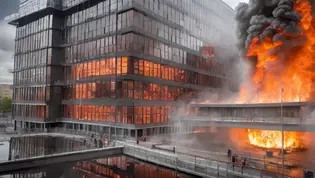Glass doors and fire protection: safety in an emergency
Glass doors are beautiful and give any room a modern ambience with lots of light.
But they also have many other advantages. For example, fire doors made of fire-resistant Glass ensure safety in many companies, public buildings and also residential buildings.
Fire-resistant Glass doors keep the heat at bay, prevent a fire from spreading to another part of the building and also prevent harmful smoke from spreading. None of Griffwerk's products are fire-resistant glass doors, but we can tell you everything you need to know on this subject.

How do Glass fire doors work?
The Glass door consists of two glass plates that have been made very heat-resistant using a special process. Between them is a liquid: water with alkali silicate and organic additives. When it burns, the temperature of the liquid rises, the water evaporates and the pressure rises. At some point, this causes the glass pane on the fire side to shatter, despite its heat resistance. The dry chemicals then swell and form a thick, dark insulating layer against heat and infrared radiation. So although the Glass ends up broken, it has served its purpose of effectively protecting the rest of the building and the people inside and buying time for the fire department.
Why Glass?
Many fire doors consist of an aluminum or steel shell and are filled with mineral wool or other insulating materials on the inside. These Doors are also effective at stopping fire. However, Glass doors for fire protection have the advantage that they provide a view of the other side. This makes it easier to recognize emergency situations and get help, or to monitor escape routes. Glass doors also provide natural light or allow artificial light to enter from the other side. This can be crucial if the power fails on the fire side. Even if it is "only" smoke, the transparency of Glass doors is often life-saving, as escape routes remain more visible.
Aesthetics and design also play a role in many buildings. Glass doors are much more attractive than Metal fire doors, which are therefore mainly found in basements or industrial facilities. Fire-resistant glass can also be provided with logos, Satin frosted or otherwise designed so that it does not stand out as fire-resistant glass in normal operation. The only indication is the special fire protection frames. These frames have special fire protection seals so that smoke and heat cannot pass through gaps to the other side.
What security levels are there?
Glass fire doors are classified according to their fire protection rating. This indicates how long the Glass can withstand fire and smoke. This classification is usually indicated by the letters "EI" followed by a number, where "E" stands for Integrity and "I" for Insulation. The number represents the duration, in minutes, for which the Glass meets the respective requirements:
EI30: This means that the Glass can maintain integrity (E) and insulation (I) in relation to fire and smoke for at least 30 minutes. Glass remains intact during this time and prevents the spread of flames and smoke. EI30 Glass is often used in residential and smaller commercial buildings, especially in areas where some fire safety is required, but None very Lengthy fire resistance.
EI60 (e.g. EI60-60): Here the Glass can maintain integrity and insulation against fire and smoke for at least 60 minutes. EI60 Glass and is often used in larger commercial buildings and public facilities. It can be used in corridors, partitions and other areas where fire protection must be guaranteed for a Lengthy period of time.
EI90: With this classification, the Glass can maintain integrity and insulation against fire and smoke for at least 90 minutes. EI90 Glass is therefore more fire-resistant than the other two classes. It is therefore used in buildings with increased fire protection requirements, such as hospitals, schools and high-rise buildings. EI90 Glass can also be installed in escape routes, stairwells and other critical areas.
EI120: This is one of the highest classifications and means that the Glass can maintain integrity and insulation against fire and smoke for at least 120 minutes. EI120 Glass is normally only used in buildings with very strict fire regulations and requirements, including airports, railroad stations, industrial facilities and buildings with high public traffic.